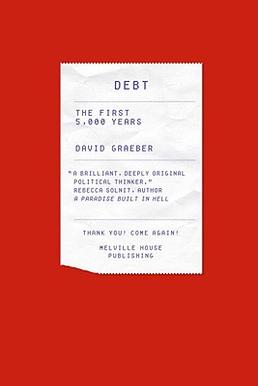Debt: The First 5000 Years (nonfiction): Difference between revisions
No edit summary |
No edit summary |
||
| Line 1: | Line 1: | ||
'''''Debt: The First 5000 Years''''' is a book by anthropologist [[David Graeber (nonfiction)|David Graeber]] published in 2011. | [[File:Debt - The First 5000 Year by David Graeber.jpg|thumb|''Debt: The First 5000 Years''.]]'''''Debt: The First 5000 Years''''' is a book by anthropologist [[David Graeber (nonfiction)|David Graeber]] published in 2011. | ||
The book explores the historical relationship of debt with social institutions such as barter, marriage, friendship, slavery, law, religion, war and government; in short, much of the fabric of human life in society. | The book explores the historical relationship of debt with social institutions such as barter, marriage, friendship, slavery, law, religion, war and government; in short, much of the fabric of human life in society. | ||
Latest revision as of 14:53, 24 April 2021
Debt: The First 5000 Years is a book by anthropologist David Graeber published in 2011.
The book explores the historical relationship of debt with social institutions such as barter, marriage, friendship, slavery, law, religion, war and government; in short, much of the fabric of human life in society.
It draws on the history and anthropology of a number of civilizations, large and small, from the first known records of debt from Sumer in 3000 BC until the present.
A major argument of the book is that when the imprecise, informal, community-building indebtedness of "human economies" is replaced by mathematically precise, firmly enforced debts, widespread impoverishment and violence are common results which only a few societies have managed to escape.
A second major argument of the book is that, contrary to standard accounts of the history of money, debt is likely the oldest means of trade, with cash and barter transactions being later developments.
Debt, the book argues, has typically retained its primacy, with cash and barter usually limited to situations of low trust involving strangers or those not considered credit-worthy.
In the News
Nonfiction cross-reference
Fiction cross-reference
External links:
- Debt: The First 5000 Years @ Wikipedia
